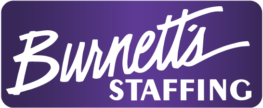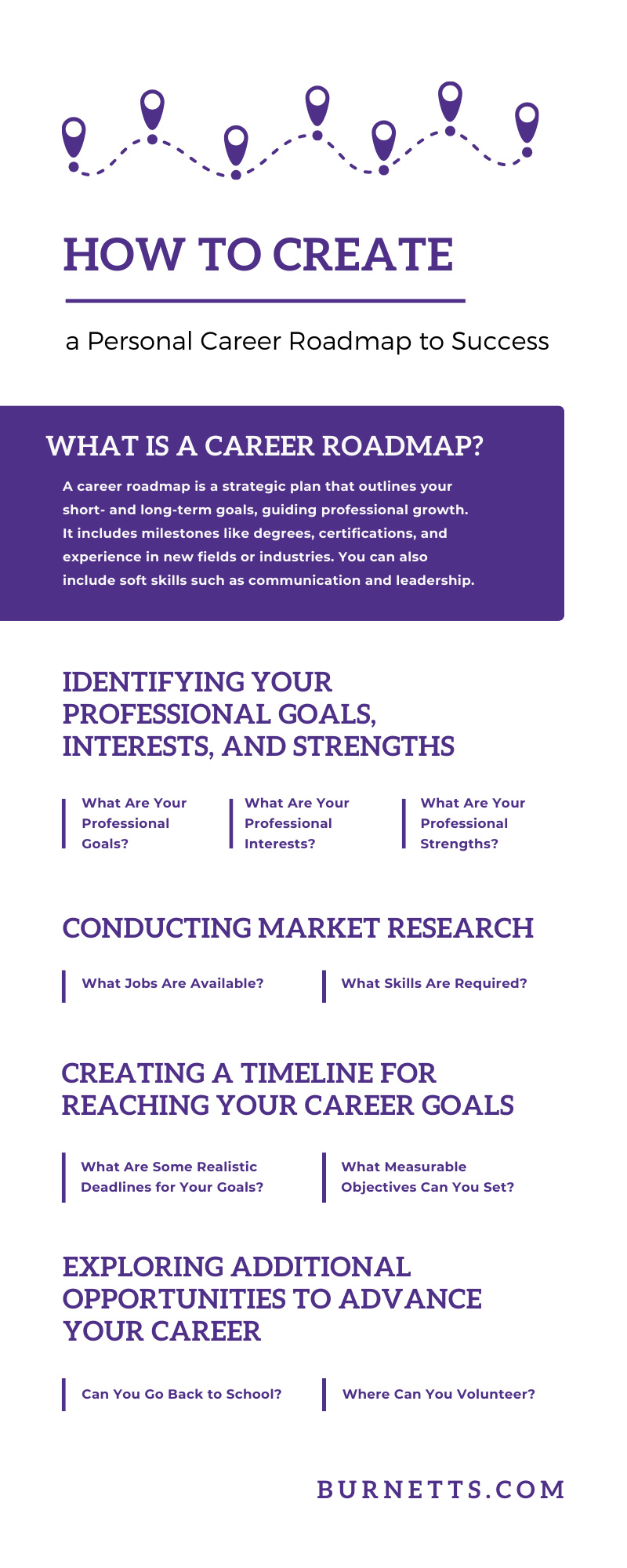
Where do you see yourself in five years? Many companies ask this question in job interviews, but it’s a question we should also ask ourselves. We must ask ourselves questions that help us reflect and challenge ourselves if we want to develop in our careers.
Another way to reflect and challenge yourself is to create a career roadmap. Keep reading to learn how to create a personal career roadmap to success.
Introducing the Concept of a Career Roadmap
Before you can create a career roadmap you must understand what it is and the benefits of making one.
What Is a Career Roadmap?
A career roadmap is a strategic plan that outlines your short- and long-term goals, guiding professional growth. It includes milestones like degrees, certifications, and experience in new fields or industries. You can also include soft skills such as communication and leadership.
What Are the Benefits of Having a Roadmap?
A roadmap brings clarity to your career journey. It also forces self-reflection on your current situation, values, and strengths and keeps you motivated as you look for a new job.
Identifying Your Professional Goals, Interests, and Strengths
Now that you know what a career roadmap is and its benefits, you can start creating one. The first step is to identify your professional goals, interests, and strengths.
What Are Your Professional Goals?
You can set professional goals of any size. For example, you could set a goal to start mentoring new employees within your company if you’re happy in your current role. You could set a goal to start a new job if you want to make bigger professional changes.
What Are Your Professional Interests?
Consider what you enjoy about your current role and what you enjoy learning about to determine your professional interests. For example, a digital marketer may enjoy the social media aspect of their role. This enjoyment can lead them to want to learn more about social media and content creation.
What Are Your Professional Strengths?
Many struggle to determine their professional strengths. You can take an assessment or ask people you work with to help you.
Conducting Market Research
After you’ve written down your goals, interests, and strengths, you should start to see a career direction. You may want to start a new job that allows you to dive further into social media marketing. You must conduct market research to achieve that goal.
What Jobs Are Available?
Before you can find your next job, you must know it exists. Research online and investigate in-person professional services, such as employment agencies, to discover which jobs are available that contribute to your goal.
What Skills Are Required?
Once you find job postings that match your goal, look at the required skills. You can learn what transferrable skills you already have and which skills you must develop. Start developing those needed skills as soon as possible so you can continue your career journey.
Building a Network Near and Far
Developing the right skills is essential to landing your next job, but so is networking. Networking in-person and virtually will connect you with people who can help you navigate the job market and along your career roadmap.
What Local Events Are Coming Up?
Attending events like job fairs, conferences, and meetups can help you grow your professional network. These events focus on connecting people with a similar job or industry in a particular area.
How Can You Network Virtually?
Virtual networking has become a popular way for people to connect with professionals across the globe. You can connect with people on LinkedIn or join professional groups on other social media platforms.
Who Do You Already Know?
Reach out to mentors, alumni, friends, family, and professional contacts near and far. Most people you already know can help you navigate your career roadmap and the job market.
Creating a Timeline for Reaching Your Career Goals
As you build your network, you’ll meet people at different points in their careers. Seeing people in these different stages can help you reflect and create a timeline for reaching your career goals.
What Are Some Realistic Deadlines for Your Goals?
It’s great to have goals, but you need a realistic deadline to keep you on track to achieve them. For example, the average person spends three to six months finding a new job. You must decide when you want to start if your goal is to get a new job. You should start applying for jobs now if you want to start in six months.
What Measurable Objectives Can You Set?
Most goals require several steps to achieve. You must determine the measurable objectives or steps, you need to achieve your goals. For example, a measurable objective is to apply to three jobs a day if your goal is to start a new job in six months.
Exploring Additional Opportunities to Advance Your Career
Your career roadmap should be bigger than a single professional goal with a specific timeline. As you work on the goals along that timeline, keep your entire career roadmap in mind. Reflect on what this goal will help you achieve and how it will contribute to your career. As you do so, you may want to explore additional opportunities that will advance your entire career, not just this timeline.
Can You Go Back to School?
Continuing education is an excellent way to advance your career. Additional education shows your commitment to your profession and willingness to learn and grow, whether it’s taking courses, earning certifications, or enrolling in a degree program.
Where Can You Volunteer?
Volunteering can help you gain skills and experience that you may not get in your current job. Many volunteer opportunities, even those not directly related to your career, can help you develop the necessary soft skills and professional networks.
Writing an Amazing Resume and Cover Letter
You can list your education certificates, volunteer roles, and other professional development on your resume. You should always keep your resume fresh with new skills, regardless of whether you need a new resume for new job applications. Pair an amazing resume with a cover letter to stand out.
Can You Customize Your Resume and Cover Letter?
You should customize your resume and cover letter to the job posting and company if you’re applying for a specific role. Each resume and cover letter should highlight the experience and skills that are relevant to that job. You don’t need to customize them immediately if you’re not ready to go on the job hunt.
Do You Need Help?
Consider seeking assistance from job placement services if you’re struggling to write an amazing resume and cover letter. Staffing companies, like Burnett’s Staffing, can help you create a professional and well-written resume and cover letter.
Now you know how to create a professional career roadmap to success for short- and long-term career development. Burnett’s Staffing is happy to help if you need job placement services, to update your resume, or to find your next role.

